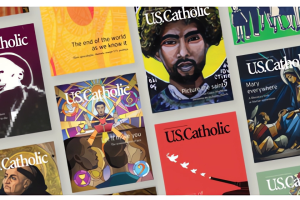c. 2014 Religion News Service
NEW YORK (RNS) Social media can bring out the worst in people, and even Pope Francis’ enormously popular Twitter feed is peppered with nasty comments. But the Vatican’s chief media strategist says the Catholic Church cannot ignore the opportunities for evangelization that the Internet offers.
“In our church we are always fishing inside the aquarium,” Archbishop Claudio Celli, head of the Pontifical Council for Social Communications, told a gathering of journalists on Thursday (May 22). “And we forget that most fish are outside the aquarium.”
Unless the church engages social media, he said, “we will wind up talking to ourselves.”
In his talk at a celebration of the church’s World Communications Day, organized by the Diocese of Brooklyn, and in other comments during a trip to New York, Celli acknowledged that social media platforms can serve as pulpits for personal attacks and can foment divisions rather than fostering community.
Speaking to digital media executives in New York on Wednesday, for example, Celli said that the Vatican has resisted entreaties by Facebook to set up a page for Pope Francis because ugly comments are harder to monitor on Facebook. He said that Vatican officials spend enough time as it is “cleaning up” the Facebook page for the Vatican’s news portal; they delete obscenities but let polite criticism stand.
Celli said that nasty remarks on Twitter are less prominent so it’s less of a concern. The pope has 4 million followers on his @pontifex account and Celli said conservative estimates indicate that through retweets and other forms of sharing some 60 million people see the brief messages — usually sent out once a day in nine languages.
“We are not naive” about the perils of social media, Celli said in an interview. “But when you enter into this arena you have to look mainly at the positive aspects.” He referred to social media as a “digital continent” that the church must treat as mission territory.
Celli, a personable Italian prelate who was named to his current post by retired Pope Benedict XVI in 2007, has pushed the Vatican to embrace new media.
The archbishop said there was something of a “crisis” when the Vatican launched a Twitter account for Benedict in 2012 because of concerns over online criticism. Celli said that in fact the number of negative comments on Twitter did spike during the last year of Benedict’s reign as he faced a barrage of bad headlines about scandals in the Vatican.
But Celli said there has been a notable shift in tone under Francis, which he attributes in part to the new pope’s own eagerness to communicate by any means possible. He said that openness to media is a direct reflection of Francis’ view of the church.
“It is about a Catholic Church that is keeping the doors open to everybody,” Celli said of Francis’ approach. “The open door allows everyone who wants to enter to come in, notwithstanding their state of life.”
The key for Catholics, Celli told his audience on Thursday, is to turn the other cheek when attacked. “Our presence (in digital media) will only be effective if we are authentic witnesses to our faith,” he said.











